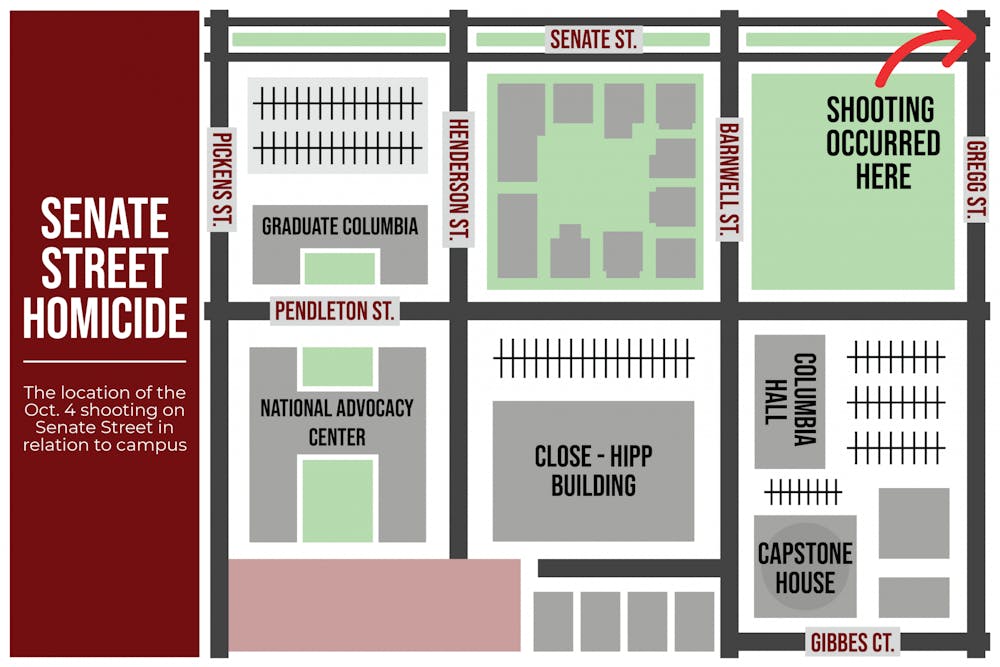In light of an October murder one block from campus, USCPD should reevaluate its criteria for Carolina Alert notifications and use the system more frequently to ensure the safety of USC’s campus community.
The Oct. 4 murder of a Greenville man by first-year transfer student Zachery Williams was especially shocking because it occurred on the 1700 block of Senate Street, just a block or so from the north side of USC’s campus.
As a resident of the 1500 block, and as someone who can see the scene of the crime from my window, I can say I personally would have appreciated a heads up. I found myself wondering why I hadn’t yet received a Carolina Alert when I first caught wind of the crime two days after it took place in a news article.
Many were wondering the same thing, and university spokesperson Jeff Stensland said in an interview with The Daily Gamecock that USCPD’s decision had to do with the prevention of white noise — the fear that if USCPD sends text notifications too frequently, they will be taken less seriously or ignored altogether.
While a valid concern, it’s hardly as if the Carolina Alert system is oversaturated – in fact, it’s used only infrequently, with the most recent alert coming nearly two full months after the alert before it (which was a flash flood warning).
There was plenty of room for a text notification to go out on Oct. 4, even considering USCPD’s concern, especially considering the severity of the crime. If a flash flood warning warrants a notification, it’s only reasonable that a murder a block from campus should as well.
Stensland thought differently, though, and said “sending out a text message to students … didn't make, really, any sense because we're not requiring students to do anything different or to take any type of action.”
However, the most recent Carolina Alert, sent to notify of an student’s tragic passing in the Honors Residence Hall on Nov. 15, didn’t require any action on the part of students. Although personally I believe the information was valuable and warranted a text, it’s worth noting that the message’s lack of a "call to action" was inconsistent with what Stensland suggested a Carolina Alert must have.
USCPD should keep consistency in mind while reevaluating its criteria for Carolina Alerts. The department should seek to give students and community members more prompt and detailed information more frequently, and without lapses in coverage such as the radio silence that followed the Oct. 4 murder.
There are models in place at other universities that approach what the Carolina Alert system should ideally resemble. For example, Temple University’s TUalerts system functions almost identically to Carolina Alerts, but is much more robust in the types of threats it notifies students of and how often it does so.
Temple’s location in North Philadelphia means that it has always been confronted with a high crime rate for the area in which most of its students live. To mitigate potential danger, TUalerts frequently notifies about shootings, police activity, civil unrest and other threats the university feels its students should be knowledgeable about.
In the instance of the Oct. 4 murder in Columbia, a similar Carolina Alert notification would have much better served the campus community. For example, a recent TUalerts notification for a shooting on Oct. 17 read “TU Alert: Shooting – reported at 13th and Susquehanna. Use caution. Avoid the area. Police are responding.” Had USCPD sent a brief message on Oct. 4 saying what had happened, where and to exercise caution, I’m sure the anxieties of many of those that reside in the area or who are frequently on campus would’ve been eased.
A Carolina Alert the morning of Oct. 4 could have been the difference between a stroll down the block or a morning in for me and – God only knows – life or death.
As a USC student, I’m grateful my campus has the protection and resources USCPD provides. I understand the department is dedicated to the safety of the university and its students, and I think USCPD could better honor that commitment by listening to its community’s desire to simply be informed.

